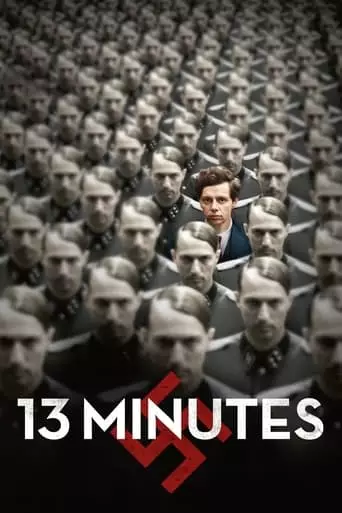The breathtaking story of a man who nearly would have changed the world. In 1939, when Hitler tricked millions of people at the height of his power, radical Georg Elser — disparaged as an assassin — is one of the greatest resistance fighters.
13 Minutes is a 2015 German historical drama directed by Oliver Hirschbiegel, chronicling the true story of Georg Elser, a German carpenter who attempted to assassinate Adolf Hitler in November 1939. The film delves into Elser’s life, motivations, and the aftermath of his failed assassination attempt.
The narrative unfolds through a non-linear structure, juxtaposing Elser’s meticulous planning and the failed assassination with his subsequent interrogation by the Gestapo. The film explores his personal life, including his relationships with his family and a woman named Else, providing insight into his transformation from an apolitical individual to a determined resistance fighter. The title 13 Minutes refers to the critical window between the bomb’s detonation and Hitler’s departure from the venue, highlighting the narrow margin that separated Elser’s act from success.
Main Themes
- Individual Resistance Against Tyranny: 13 Minutes portrays the courage of an ordinary man who, driven by moral conviction, takes a stand against a tyrannical regime. Elser’s solitary act of defiance underscores the impact one individual can have in challenging oppressive systems.
- Moral Conviction and Sacrifice: The film delves into the moral complexities of resistance, highlighting Elser’s unwavering belief in his cause despite personal risks. His willingness to sacrifice his life for his principles exemplifies the profound commitment to justice and humanity.
- The Human Cost of Political Oppression: Through Elser’s story, the film illuminates the severe repercussions faced by those who oppose authoritarian regimes. It sheds light on the personal and familial toll of political dissent during Nazi Germany.
- The Nature of Heroism: 13 Minutes challenges traditional notions of heroism by focusing on an unsung individual whose actions, though unsuccessful, were driven by a deep sense of duty and morality. It prompts reflection on the true essence of heroism beyond public recognition.
- Psychological Resilience Under Torture: The film portrays Elser’s psychological endurance during his interrogation, highlighting the human capacity to withstand extreme pressure and maintain one’s integrity under duress.
Impact of the Movie
13 Minutes received generally positive reviews from critics, holding an approval rating on Rotten Tomatoes. The site’s critical consensus reads, 13 Minutes explores an oft-neglected corner of World War II history with just enough craft and narrative momentum to offset a disappointing lack of subtlety.
The Guardian described it as a heartfelt study of a man who tried to kill Hitler, praising Christian Friedel’s performance as Elser.
However, some critics noted the film’s lack of subtlety and overbearing sentimentalism.
7 Reasons to Watch 13 Minutes
- Compelling True Story: 13 Minutes brings to light the remarkable yet often overlooked story of Georg Elser, offering a fresh perspective on World War II resistance efforts. The film’s dedication to historical accuracy provides viewers with an engaging and educational experience.
- Strong Performance by Christian Friedel: Christian Friedel delivers a nuanced portrayal of Georg Elser, capturing the character’s internal struggles and moral convictions. His performance adds depth and authenticity to the film, making Elser’s journey both relatable and poignant.
- Thought-Provoking Themes: The film explores complex themes such as individual resistance, moral conviction, and the human cost of political oppression. These themes encourage viewers to reflect on the nature of heroism and the impact of personal choices in the face of tyranny.
- Historical Insight: 13 Minutes provides valuable insight into a lesser-known aspect of World War II history, shedding light on the personal stories of those who resisted Nazi rule. This historical perspective enriches viewers’ understanding of the era and the diverse forms of resistance.
- Emotional Depth: The film effectively conveys the emotional turmoil and resilience of its characters, particularly Elser. The portrayal of his relationships and personal sacrifices adds a human element to the historical narrative, making it more engaging and impactful.
- Cinematic Direction: Oliver Hirschbiegel’s direction ensures a compelling and immersive viewing experience. His use of non-linear storytelling and attention to detail in recreating the historical setting enhances the film’s authenticity and emotional resonance.
- Educational Value: Beyond its entertainment merits, 13 Minutes serves as an educational tool, introducing audiences to a significant yet underrepresented figure in history. It prompts discussions about the nature of resistance and the moral complexities faced by individuals under oppressive regimes.
How Will You Feel After Watching 13 Minutes?
After watching 13 Minutes, you may experience a profound sense of admiration for the resilience and moral conviction of individuals who stand against tyranny. The film’s portrayal of Georg Elser’s courage and sacrifice is both inspiring and humbling. You might also feel a deep empathy for the personal and familial struggles depicted, leading to a greater appreciation for the complexities of human nature under extreme circumstances. The film’s emotional depth and historical significance are likely to leave a lasting impression, prompting reflection on the themes of resistance, morality, and the human cost of political oppression.

